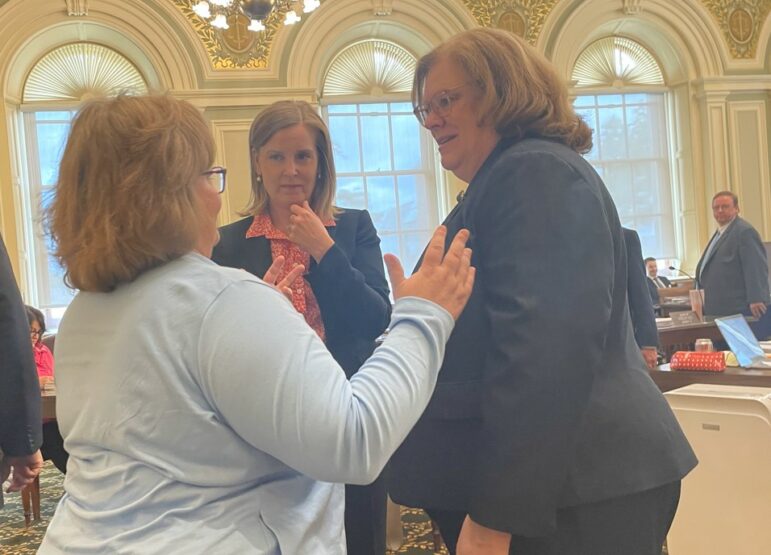By GARRY RAYNO, InDepthNH.org
CONCORD —- The Senate Thursday voted down party lines to keep alive a bill requiring appropriate and reasonable medical treatment for any child born alive.
House Bill 233 would charge medical professionals who fail to follow the bill’s dictates with a class a felony punishable by seven-and-a-half years in prison or more.
While bill supporters call it the born alive infant protection act, doctors and others say it is harmful to parents, infants with no chance of survival and physicians.
The Senate voted 14-10 to re-refer the bill for more work.
“We heard very compelling testimony on both sides of the issue,” said Sen. Sharon Carson, R-Londonderry, who chairs the Senate Judiciary Committee. “It is a complicated bill that deals with a very challenging topic and (we need more time).”
But opponents said not only is it horrible for families and their medical providers at an unthinkable time, it could also thin the already slim ranks of professionals who provide prenatal and natal care in the state.
“There is nothing worth salvaging about a bill that would take away the last precious moments a parent has with their dying child,” said Sen. Becky Whitley, D-Hopkinton. “The hearing on HB 233 made it abundantly clear, this cruel bill has no place in New Hampshire.”
Sen. Denise Ricciardi, R-Bedford, said the state offers more protections to birds than it does to fetuses.
“A human life should not be thrown away if intent is to terminate it,” she said, noting some have survived and gone on to have children of their own.
They deserve the life they fought to live, she said, noting the incident of babies born alive during an abortion do happen in New Hampshire, although others say it does not.
Other senators said the state has no business making these determinations for the parents of dying children.
“This bill operates under the false pretense that our medical providers are leaving newborn babies to die,” said Sen. Jay Kahn, D-Keene. “That idea is blatantly untrue and already illegal.”
He said the committee heard testimony from a parent who said if her child were one year old and dying, there would be no question about her making a determination about medical treatment, but that would not be true if it were a fetus.
“Making a determination about the end of life for their child,” Kahn said, “I don’t think we belong here.”
The Senate also voted down party lines to table House Bill 625, which would prohibit performing an abortion after the 24th week of pregnancy with few exceptions.
The bill would also make a provider who does perform an abortion criminally liable.
The content of the bill was inserted into House Bill 2, or the budget package, by Senate Finance the day before.
If the Senate had passed the bill, and the House agreed to the Senate changes, it would have gone to Gov. Chris Sununu for action.
By tabling the bill, the governor does not have to act on the bill.
Charter Schools
The Senate approved House Bill 278 which gives charter schools the right of first refusal for an unused school building.
Charter schools have had a difficult time finding affordable and appropriate spaces for their operations.
The Senate amended the bill to clearly define what an unused school facility is.
Sen. Erin Hennessey, R-Littleton, said the bill does not mandate a sale or lease, or seek a discount, but requires superintendents to provide the Department of Education with a list of unused school buildings.
“This bill not only benefits public school children,” she said, “but New Hampshire taxpayers as well.”
But Senate Minority Leader Donna Soucy, D-Manchester, said the bill could interfere with local control, noting her city is considering closing two of its three high schools and moving some city departments into the schools to save money on rent.
The bill was approved on a voice vote and goes back to the House due to the Senate changes.
Guns
The Senate approved bills expanding gun rights in the state.
House Bill 195 would exempt displaying a firearm from the reckless conduct statute.
According to Sen. Sharon Carson, R-Londonderry, the bill is aimed at allowing someone who carries a sidearm publicly to avoid a reckless conduct charge.
But opponents said the bill is too vague and would allow someone to intimidate another person by displaying the firearm in a threatening manner without pointing it at the person.
The bill goes back to the House due to changes the Senate made.
The Senate also approved allowing a person to carry a loaded firearm on an OHRV or snowmobile.
The practice is currently prohibited.
Supporters said the prohibition should have been removed when concealed carry was approved without a permit several years ago, but opponents said there are good reasons not to change the law such as accidental discharge on a bouncing vehicle or a game warden approaching someone in the wilderness.
Mug Shots
The Senate decided to study a bill to prohibit the distribution of mug shots of people arrested but not convicted unless there is a compelling reason such as public safety or to further an investigation.
Several senators objected to further studying the bill saying they believe they found the proper balance between the public right to know and an individual’s right to privacy.
An individual is innocent until proven guilty in a court of law, said Sen. Harold French, R-Webster. “But the court of public opinion can have a tremendous effect on a person’s life.”
Once these photos are distributed by police, a person can be saddled for life, he noted.
Kahn said he believed they had included enough provisions to protect the public’s safety while preserving a person’s privacy.
“This is not a complete and total prohibition on releasing post arrest photos,” he said.
But Sen. Bill Gannon, R-Sandown, said the police chiefs have reasons for asking for the Senate to work on the bill some more.
He noted two recent incidents in Manchester, one involving a shooting and the other illicit photos, where police sought additional information.
“The police have very good reasons for asking us to take this back and try to get the balancing right,” Gannon said.
Cannabis Sales
The Senate gave final approval to a bill allowing out-of-state residents who qualify for their state’s medical marijuana program to purchase cannabis up to three times in New Hampshire in a year.
House Bill 605 also adds opioid addition to the list of ailments under the New Hampshire medical marijuana law.
Under the bill, a person who lives in another state or Canada, may purchase more than three times from a New Hampshire dispensary with a physician’s authorization letter.
People who qualify for state medical marijuana programs cannot legally transport the product from state-to-state.
The bill now goes back to the House due to changes the Senate adopted.
Garry Rayno may be reached at garry,rayno@yahoo.com.





